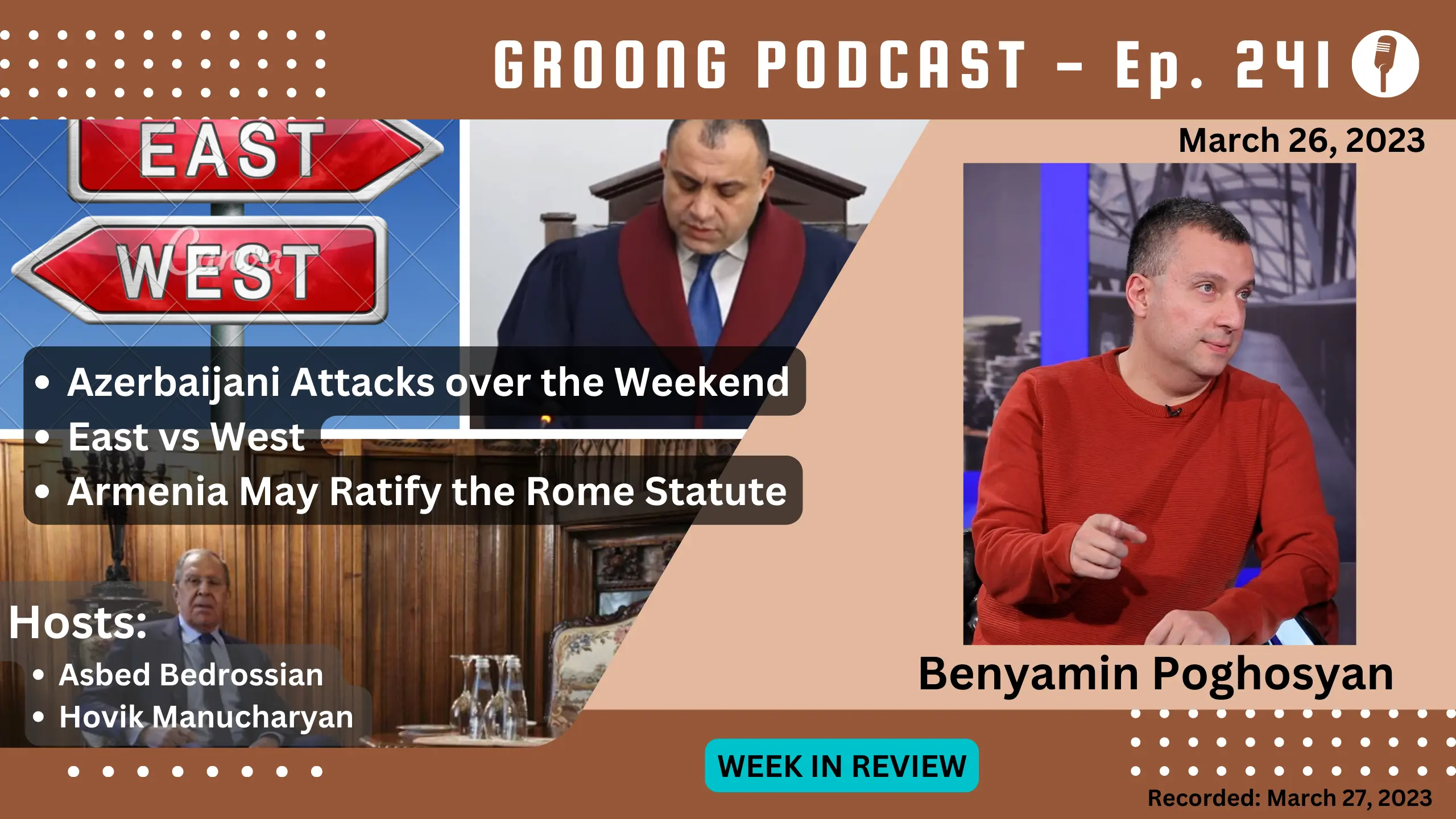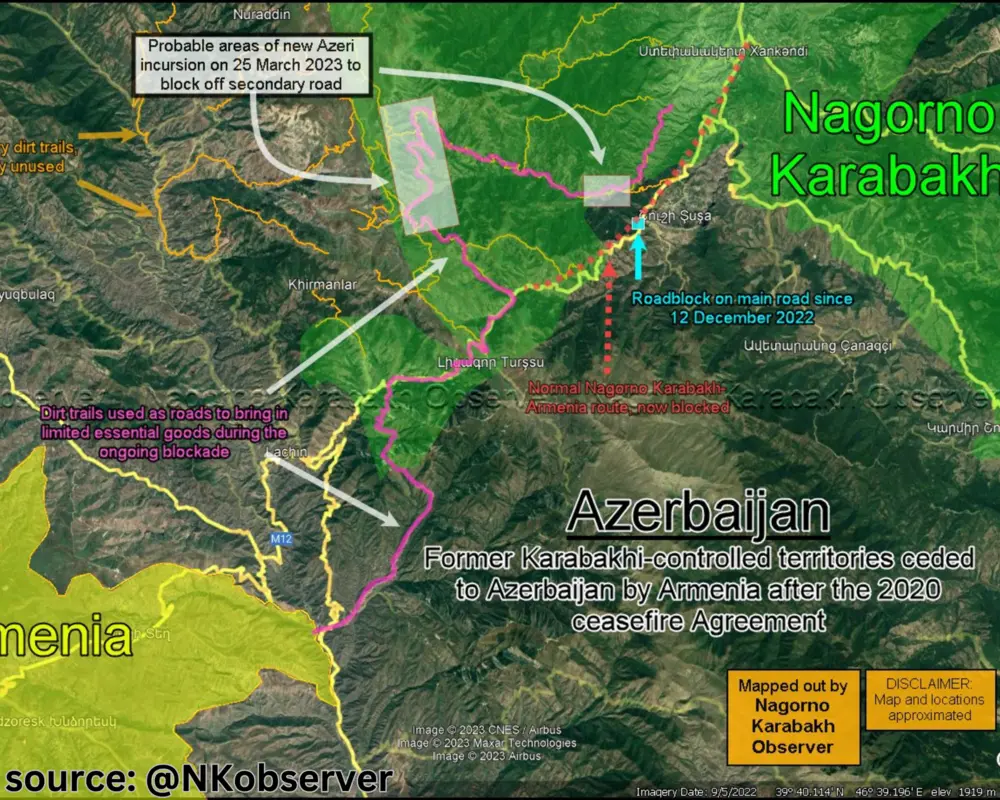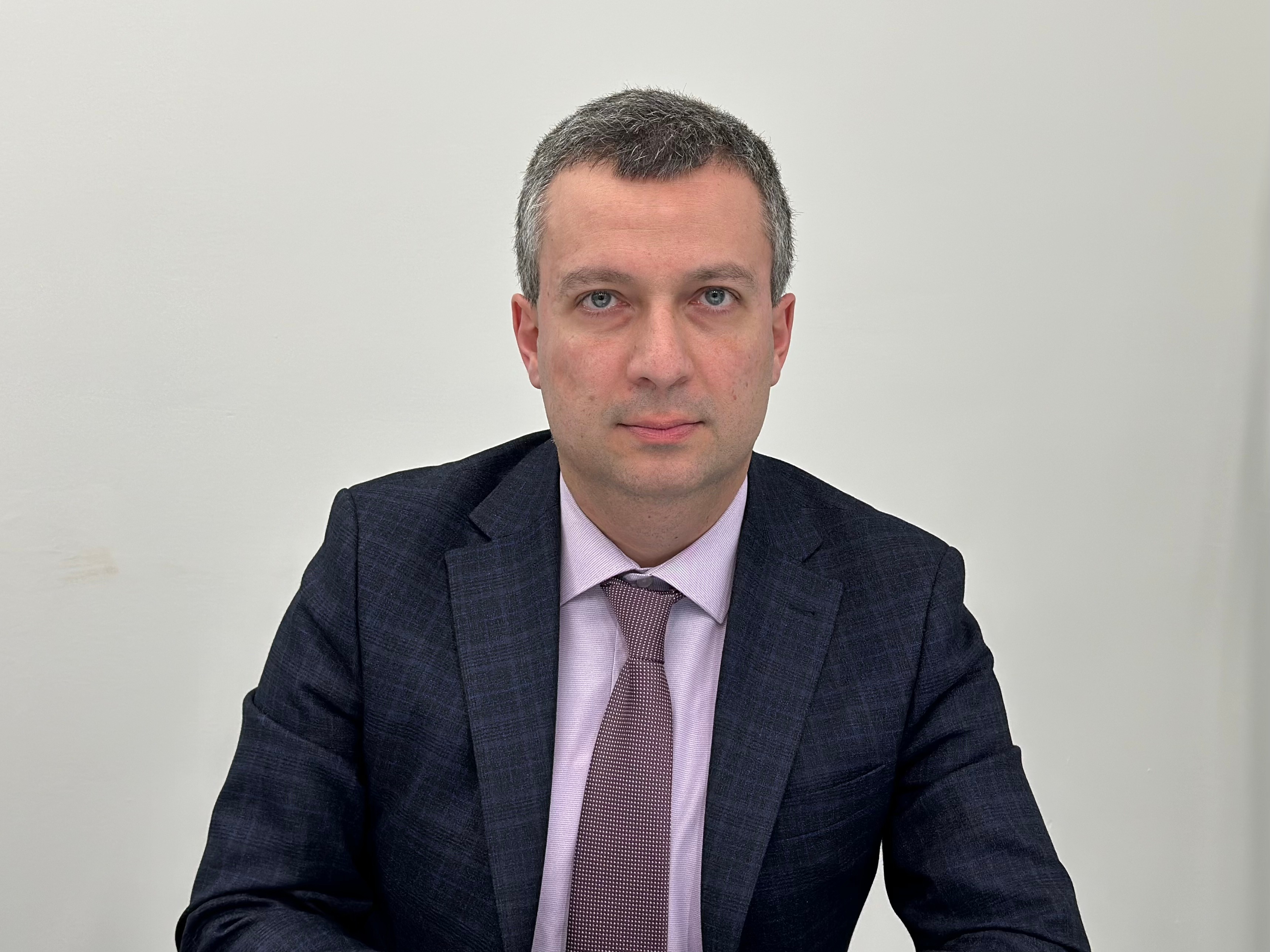
Guest:
Topic:
- Azerbaijani Attacks over the Weekend
- East and West
- Armenia and the Rome Statute
Episode 241 | Recorded: March 26, 2023
Show Notes
Azerbaijani Attacks
Over the weekend, Azerbaijan blatantly violated the Nov. 9, 2020 agreement, which it co-signed with Armenia and Russia, by unilaterally advancing its armed forces into the territory of Artsakh.

Source: @NKObserver
The Russians blamed Azerbaijan for this violation. The aim of this incursion was a dirt road which was allegedly used to bypass the Azeri blockade of Artsakh since Dec.12, 2022.
Additionally, Artsakh has reported that its civilians have been targeted in the regions of Martuni, Taghavard, and Shosh.
Questions:
- Are these violations and terroristic actions by Azerbaijan a sign that the negotiations with Armenia are not proceeding along Aliyev’s stated tenet, that all Armenia has to do is to agree to all Azeri conditions?
- What are the tactical objectives and implications of the Azerbaijani ground gains?
The events in Artsakh came after a week of instability created by Azerbaijan. Against the backdrop of continuous shooting at civilians, the violence transferred to Armenia proper. An Armenian soldier was killed in Yeraskh. There was also a peculiar incident reported where an Armenian serviceman was reported to have lost his way, resulting in a search and rescue operation by Armenia as well as Russian border guards. The Russian soldiers apparently came under fire from Azerbaijanis, despite having previous consent to search for the missing serviceman. Later, there were reports that two Russians received medical treatment in an Armenian hospital for wounds received during the operation, however, the hospital’s spokesperson was quick to rule gunshots as the injury for which the Russians visited the hospital.The Armenian defense ministry and the Russian defense ministry were silent on the incident.
Questions:
- What is your assessment of what took place?
- What is the reason for Russia’s silence?
East and West
Armenia continues to bounce around from platform to platform in its negotiations with Azerbaijan. For most of the latter half of 2022 it was the Brussels platform under the auspices of the EU, whether they met in Brussels, or Prague, or wherever. In December 2022, Armenia “postponed” the trilateral meeting in Moscow, with Lavrov and Bairamov, while inviting 100 EU observers to come to Armenia and observe its borders with Azerbaijan, despite warnings from Russia, Iran, and Azerbaijan.
East
Last Monday Ararat Mirzoyan met with Russian foreign minister Lavrov in Moscow.
Question:
- What were the reasons for this visit to Moscow, and what was achieved there?
Mirzoyan said that Armenia had not rejected the CSTO monitors. Lavrov also said this. Armenia has also said that unless CSTO members state that Azerbaijan is the aggressor in the South Caucasus conflict, there is no room for an agreement to deploy CSTO forces to Armenia.
Question:
- Are we seeing a managed political backtracking by Armenia, vis-à-vis the CSTO, or just a bunch of face-saving by all sides?
Lavrov once again repeated president Putin’s frequent claim that the 44-day war could have been stopped earlier. He was most likely referring to Russia’s attempts to broker a ceasefire on October 5 and October 19 of 2020, which according to Putin and others were rejected by Armenia.
Question:
- Why are these assertions important today?
One important aspect in Moscow was Lavrov’s mentioning of the autonomy or status cases of Donbas and Kosovo, as possible models for Artsakh.
First, let’s remember that Russia failed the Serbians of Kosovo in the 1990s. NATO air force actually bombed Serbia, and the EU has been dangling the carrot of membership to both Serbia and Kosovo since then. As for Donbass, that issue is still being adjudicated of course; Russia as a superpower was engaged as a side, and in the end they intervened in Donbass when Ukraine refused even the basic cultural autonomy to the Russians of Donbass.
Questions:
- What is the carrot that Russia is dangling in front of Armenia?
- Are the comparisons between the cases of Artsakh, and Donbas or Kosovo valid?
West
As far as the western platforms go, they’ve been all talk and no walk so far. Despite a lot of sympathetic political statement from Euro MEP’s, the US Congress, as well as some government officials, and even a “binding” decision by the ICJ telling Azerbaijan to drop the #ArtsakhBlockade and free all movement through the Lachin/Berdzor corridor, there is no activity to ensure any steps towards peace. If anything, the US has said that no sanctions are being considered against Azerbaijan, and the EU has said through its multiple diplomats that they can not “save” Armenia from Azeri aggression.
So Azerbaijan is basically doing whatever it wants, by reneging on its trilateral commitment, tightening the blockade, murdering Armenian civilians, and continuing on its belligerent path. As a result, Pashinyan has confessed that he’s negotiating with a dishonest partner, for a “peace treaty”that would guarantee neither peace, nor even non-aggression!
Question:
- What is a “peace” treaty that can not guarantee peace?
As Pashinyan bounces between east and west, western NGOs and the US State Department have issued multiple negative reports on Armenia; for slipping in the democracy index; human trafficking, media freedom; transparency; etc.
The west has been floating the Pashinyan government since it came to power. Armenia’s national debt has increased more than 50% since 2018, so it’s clear that the expectations of Pashinyan are that he will sign what Azerbaijan wants, and create an opportunity for The West to evict Russia from the South Caucasus. Perhaps also there are expectations that Armenia will sign the Rome Statute, and we’ll talk about this in a minute, and other western championed legislatures that would, frankly, corner Armenia into very difficult choices at this moment in global challenges.
So the warnings from The West have become pretty strident, that going back to Moscow is not part of the plan for Pashinyan. He tweeted before the weekend that:
_There will be a [#peace](https://twitter.com/hashtag/peace) treaty between [#Armenia](https://twitter.com/hashtag/Armenia) and [#Azerbaijan](https://twitter.com/hashtag/Azerbaijan), and it will be based on the joint official statements adopted at the highest level. There won’t be а new escalation! The international community must strongly support this narrative._
Questions:
- What is the source of Pashinyan’s confidence?
- Benyamin, what’s your narrative on Pashinyan bouncing around from platform to platform? What is working and what is not working for him?
- Is The West hinting that they could cut off the support that has kept Pashinyan in power since 2018?
Armenia May Ratify the Rome Statute
Within the global conflict for power, the Armenian government has a new dilemma on its hands. In December of 2022, Pashinyan’s government made a decision to ratify the “Rome Statute” which is the treaty that established the International Criminal Court. Just before last weekend, the Armenian constitutional court greenlit for the government to ratify The International Criminal Court Treaty. Full ratification would mean that ICC members are required to implement decisions of the court.
In the meantime, only two weeks ago, the ICC issued an international warrant on Russian president Putin, as a war criminal. Just today, Monday, RIA Novosti cited an unnamed source in the Russian MFA saying that it is “absolutely unacceptable” for Armenia to ratify the Rome Statute in the backdrop of the ICC arrest warrant against Putin. The source further said that Yerevan was warned about “extremely negative” consequences for the bilateral relationship if Armenia were to proceed.
Despite the ICC being a legal institution, it seems there’s a big political side to all of this so we wanted to get your opinion as a political scientist.
Question:
- What would this mean for Armenia’s relationship with Russia? Most analysts welcomed Armenia’s decision to ratify the Rome Statute in December. But would this be the right time to start the ratification process? It seems that such a ratification at present would corner Armenia into taking sides in a global storm much above its level.
Wrap-up
We hope you found our Week in Review helpful. We invite your feedback and your suggestions, you can find us on most social media and podcast platforms. Thanks to Laura Osborn for the music on our podcasts.
Guests

Benyamin Poghosyan
Dr. Benyamin Poghosyan is a Senior Research Fellow at APRI Armenia, a Yerevan based think tank,and the Chairman of the Center for Political and Economic Strategic Studies. He has served as the vice president for research and head of the Institute for National Strategic Studies at the National Defense Research University in Armenia. Dr. Poghosyan was a Distinguished Research Fellow at the US National Defense University College of International Security Affairs. He is a graduate from the US State Department Study of the US Institutes for Scholars 2012 Program on US National Security Policy Making. He holds a PhD in history and is a graduate from the 2006 Tavitian Program on International Relations at Fletcher School of Law and Diplomacy.
Hosts

Hovik Manucharyan
Hovik Manucharyan is an information security engineer who moved from Seattle to Armenia in 2022. He co-founded the ANN/Groong podcast in 2020 and has been a contributor to Groong News since the late 1990s.
Disclaimer: The views expressed by Hovik Manucharyan on the ANN/Groong podcast are his own and do not necessarily reflect the opinions of his employer or any other organization.

Asbed Bedrossian
Asbed is founder of the Armenian News Network Groong and co-founder of the ANN/Groong podcast.